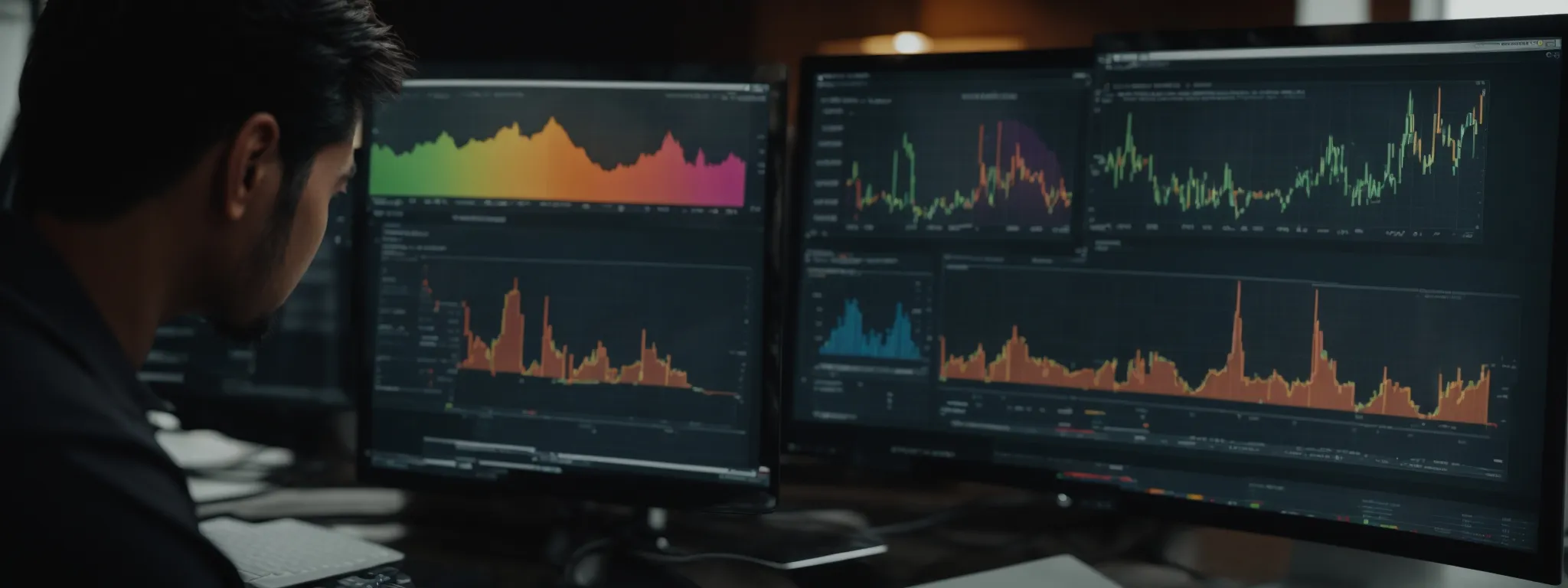How To Use Google Analytics Filters Like a Pro
Mastering Google Analytics Filters for Professional Insights Navigating the maze of data in Google Analytics can seem daunting, but armed with the right knowledge of filters, professionals […]
Mastering Google Analytics Filters for Professional Insights
Navigating the maze of data in Google Analytics can seem daunting, but armed with the right knowledge of filters, professionals can unlock a treasure trove of insights.
From the initial setup to advanced customization, mastering Google Analytics filters allows organizations to sculpt their data for clarity and relevance.
Whether it’s to exclude internal traffic or refine campaign data, employing filters transforms raw data into strategic wisdom.
This article walks you through everything from the simplicity of setting up basic filters to the finesse required for intricate filter patterns.
Keep reading to elevate your data analysis skills and gain professional insights with Google Analytics filters.
Key Takeaways
- Google Analytics Filters Are Essential for Refining Data and Gaining Strategic Insights
- LinkGraph’s SEO Services Employ Meticulous Filter Patterns and Testing for Advanced Data Segmentation
- Regular Reviews and Updates of Google Analytics Filters Are Crucial to Maintain Data Integrity
- Proper Filter Naming Conventions Enhance Consistency and Ease of Future Analytics
- Alerts and Advanced Segments in Google Analytics Aid in Proactive Data Management
Understanding the Basics of Google Analytics Filters

Embarking on the journey of data optimization within Google Analytics begins with a fundamental grasp of filters, vital tools for professionals seeking to refine and customize their insights.
Navigating to Google Analytics’ filters section uncovers the potential to tailor data sets, separating the noise from the nuances that drive strategic decisions.
Mastery of these filters requires distinguishing between predefined conditions and the versatility of custom filter options.
Moreover, discerning the scope of each filter’s impact is paramount for segmenting data with precision.
With a focus on clarity, one should adhere to systematic naming conventions when designing filters to ensure consistency and ease of future analysis.
Navigate to the Filters Section in Google Analytics
Initiating the process of data refinement, users engaging with LinkGraph’s SEO services navigate to the Google Analytics interface to locate the filters section. There, they are presented with a suite of options to manage incoming data, setting the stage for precise analytical practices.
The filters section is accessible through the ‘Admin’ tab, where professionals meticulously configure settings to sieve through data. This critical step enables LinkGraph’s SEO services to focus on relevant information, effectively streamlining the data analysis process for their clients.
Differentiate Between Predefined and Custom Filters
In the realm of Google Analytics, professionals are presented with an essential choice between predefined and custom filters, each catering to different analytical needs. Predefined filters offer a straightforward method to quickly apply common filters such as including or excluding traffic from specific IP addresses or geographic locations.
Custom filters, on the other hand, grant analysts at LinkGraph’s SEO services the flexibility to craft unique conditions tailored to the intricate nature of their client’s data. These filters can range from complex patterns using regular expressions (regex) to the exclusive inclusion of specific campaign data, allowing for in-depth customization and precise data segmentation.
Recognize the Scope of Filters for Accurate Data Segmentation
Grasping the concept of filter scope is integral for professionals utilizing LinkGraph’s SEO services to enhance their data segmentation. Accurately applying filters at the view level allows for the modification of data within specific Google Analytics views, ensuring that reports reflect precise user engagements and behaviors, which are directly aligned with the client’s objectives.
The efficacy of LinkGraph’s SEO services is further amplified by their strategic use of filters to either broadly affect all data or to meticulously hone in on specific subsets. This discernment empowers analysts to create distinct data streams, from broad-reaching insights down to the granular details of a single campaign or audience segment, facilitating bespoke data analysis for informed decision-making.
Apply Best Practices When Naming Your Filters
Implementing an effective naming convention for filters within Google Analytics is a cornerstone of LinkGraph’s SEO services. Each filter is meticulously labeled in a way that delineates its function and the scope of data it impacts, thus enabling swift identification and adjustments when necessary.
LinkGraph’s team emphasizes consistency in filter naming, aligning them with the strategic goals of the analytics project. This practice ensures that every filter reflects its purpose and parameters clearly, aiding analysts in maintaining structured and comprehensible data within their reports.
Step-by-Step Guide to Creating Google Analytics Filters

As professionals refine their Google Analytics expertise, mastering the creation of filters stands at the core of transforming raw data into actionable insights.
Insightful data management commences by accessing and managing filters, a skill crucial for LinkGraph’s SEO services to deliver bespoke analytical outcomes.
It involves a thoughtful selection of filter types, calibrated precisely to meet specific business objectives.
Crafting filter patterns necessitates a meticulous approach—ensuring every character serves a purpose and contributes to data clarity.
Prior to integrating these filters into their views, SEO experts verify them to confirm their accuracy and effectiveness, safeguarding the integrity of the data analysis process.
The following guidance encapsulates this crucial workflow, enhancing one’s ability to draw professional insights from complex data.
Access Filter Management in Google Analytics
Securing a robust analytical foundation begins with smooth access to the filter management section in Google Analytics. Once within the ‘Admin’ interface, professionals seeking to leverage LinkGraph’s SEO services find a gateway to enhance their data tracking precision through the adept application of filters.
By selecting the appropriate view under the property settings, data specialists are afforded the ability to manage and apply filters directly, an essential step in preparing the analytics environment for tailored data interpretation and insight generation aligned with specific business needs.
Select the Filter Type for Your Specific Goals
Choosing the filter type to match organizational objectives is a critical decision in Google Analytics. LinkGraph’s SEO services impart the significance of selecting a filter type—be it predefined or custom—that aligns with the unique metrics and targets of each campaign.
Whether it’s enhancing a local SEO approach, refining an SEO content strategy, or conducting a free backlink analysis, the appropriate filter type acts as a magnifying lens over the critical data points:
- Predefined filters for quick, rule-based exclusions or inclusions.
- Custom filters for intricate, pattern-based data manipulation.
- Advanced filters for combining or modifying field values for superior data sets.
LinkGraph’s seasoned SEO professionals consider the breadth and depth of data before implementing filters, ensuring the most relevant insights are captured for data-driven strategy development.
Define Filter Patterns With Precision
Defining filter patterns demands meticulous attention, as these determine the effectiveness of data separation and analysis. Precision in developing filters is the hallmark of LinkGraph’s SEO services, ensuring that only the most relevant analytics data feeds into their clients’ strategies.
Employing regular expressions, or regex, LinkGraph’s SEO professionals tailor filter patterns to match exact string sequences, guaranteeing that data streams align with the nuanced requirements of each unique client engagement:
| Filter Type | Description | Application Example |
|---|---|---|
| Exclude/Include | Removes or retains data based on predefined criteria | Excluding traffic from internal IP addresses |
| Lowercase/Uppercase | Converts text to lower or upper case for uniformity | Transforming campaign parameters to a consistent case |
| Search and Replace | Performs search-and-replace operations on predefined fields | Replacing ‘https://’ with ‘http://’ for consistency |
| Advanced | Allows for complex operations such as field concatenation | Combining hostname with request URI for full page URL tracking |
Through a detailed and disciplined approach to regex and filter patterns, LinkGraph’s SEO services effectively streamline complex datasets, contributing to the optimization of their client’s digital marketing efforts.
Verify Your Filter Before Applying to Views
Prior to finalizing any filter, it is paramount that professionals employing LinkGraph’s SEO services conduct thorough verification. This preemptive step serves as an assurance, confirming the filter operates as intended and data integrity is upheld.
Verification can prevent unforeseen data discrepancies that may arise within Google Analytics reports, saving valuable time for LinkGraph’s SEO services experts in future data extraction and analysis efforts:
- Run a test view to observe the filter’s effect and ensure it accurately refines the data without unintended consequences.
- Inspect the filter’s impact on historical data to guarantee compatibility and coherence with existing reporting structures.
Once verified, these filters can be confidently applied to views, marking a critical milestone in the journey of extracting professional insights that inform compelling SEO strategies.
Advanced Techniques for Google Analytics Filter Customization

In the upper echelons of data analysis, mastery over Google Analytics filters represents a decisive edge for SEO experts.
These filters, employed thoughtfully and creatively, can unearth compelling insights, generate nuanced reports, and lead towards informed decision-making within the digital marketing sphere.
As professionals augment their skills in configuring Google Analytics, they often harness the power of Regular Expressions for dynamic filtering, combine multiple filters for a multi-faceted view of their data, sequence filters to map specific user journeys, and deploy include and exclude filters for refined data clarity.
Each technique opens a portal to deeper understanding and cleaner analytics, essential for organizations to remain agile and data-driven in their strategic approaches.
Employ Regular Expressions for Dynamic Filtering
Dynamic filtering through the employment of Regular Expressions (regex) stands as a testament to the sophistication a professional can achieve with Google Analytics. LinkGraph’s SEO services deftly implement regex to filter data robustly, crafting nuanced patterns that precisely isolate behavioral patterns across user interactions.
Such nimble use of regex, orchestrated by LinkGraph’s experts, means intricacies within the data are no longer shrouded and actionable insights can be gleaned with remarkable specificity. This proficiency elevates the analytical capabilities, driving SEO strategies that resonate with sharp accuracy in targeting and optimization.
Combine Multiple Filters for Layered Insights
Experts at LinkGraph’s SEO services recognize the potency of merging multiple filters within Google Analytics to unravel complex layered insights crucial for high-stakes data analysis. By systematically combining various filters, they meticulously distill broad data sets into concentrated streams of significant intelligence that inform strategic decisions and tactical adjustments.
This structured approach to layering filters enables a clear visualization of intersecting data points, determining subtle correlations that yield a richer understanding of audience behaviors and preferences. Layered insights facilitate comprehensive audience profiles and behavioral patterns, vital for crafting highly targeted SEO content strategies:
- Sequential application of filters to track user journeys from acquisition through conversion.
- Interplay of include and exclude filters to segregate traffic precisely for distinct campaign assessment.
- Use of custom regex filter arrangements to pinpoint specific event triggers within user interactions.
Through this rigorous analysis, LinkGraph’s SEO services ensure that data is not only clean but also astutely organized to expose the underlying narratives that shape a company’s digital landscape.
Configure Sequence Filters for Specific User Journeys
LinkGraph’s SEO services optimize the user-journey assessment by configuring sequence filters within Google Analytics, enabling professionals to trace a user’s pathway through a site with enhanced clarity. By setting up sequential filters, they carve out the various stages a user traverses, from initial landing to conversion, providing invaluable insights for optimizing the customer journey.
The arrangement of sequence filters sheds light on the visitor’s narrative, allowing LinkGraph’s SEO experts to detect pivotal moments within the user experience. Such targeted insight paves the way for improved on-page SEO services and meticulous refinements in content strategy, ensuring the pathway to conversion is as intuitive and persuasive as possible.
Integrate Include and Exclude Filters for Cleaner Data
LinkGraph’s SEO services meticulously employ include and exclude filters in Google Analytics to distill data into its purest form. By selectively including pertinent data points and excluding irrelevant noise, these filters sharpen the focus on quality data, critical for constructing refined SEO campaigns and content strategies.
The judicious application of these filters by LinkGraph’s experts facilitates the exclusion of superfluous information, such as internal traffic or foreign IP addresses, ensuring reports are populated with the most relevant data necessary for insightful analysis and impactful decision-making.
Streamlining Data With Google Analytics Filter Patterns

Professionals in the realm of digital analytics understand that the ability to sift through complex data sets and extract pivotal insights requires adept manipulation of Google Analytics filters.
As part of a strategic approach to data analysis, LinkGraph’s SEO services leverage advanced filter patterns, ensuring that data is not only accurate but also actionable.
Simplifying URLs with search and replace filters, refining full URLs or uniform resource identifiers (URI) components, setting up filters to consolidate crucial data points, and employing case sensitive filters are all techniques designed to elevate analytical precision.
These filters are architected to boost consistency and optimize reporting, transforming a good data analysis process into an exceptional one.
Simplify URLs With Search and Replace Filters
LinkGraph’s SEO services provide valuable expertise in decluttering website traffic data through the strategic utilization of Search and Replace filters in Google Analytics. These filters act as precision instruments to simplify complex URLs, transforming them into clearer, unified forms for augmented data analysis and reporting.
With expert application of such filters, professionals streamline the aggregation of session data, enhancing the accessibility and interpretation of traffic sources. LinkGraph’s approach ensures that the processed URLs contribute to a more coherent understanding of visitor interactions and site performance.
Refine Full URLs or URI Components Effectively
In the nuanced world of digital analysis, refining full URLs or Uniform Resource Identifier (URI) components epitomizes the kind of granular control professionals can exert with Google Analytics. LinkGraph’s SEO services exemplify this precision, employing filters that segment URI attributes effectively for cleaner, more insightful dataset interpretations.
Effective URL refinement hinges on identifying key performance indicators and isolating them within the complex fabric of a website’s structural data. The sophisticated methods applied by LinkGraph’s SEO services include:
- Implementing powerful Search and Replace filters to correct inconsistencies in request URIs.
- Exploiting Advanced filters to construct full URLs that reveal the user’s journey through every page.
- Utilizing Request URI modifications to distinguish between similar content with discernible parameters.
These strategies underscore the importance of meticulous filter application, a hallmark of professional SEO analysis performed by LinkGraph, ensuring clients receive coherent and actionable insights from their data.
Set Up Filters to Consolidate Data Points
Deploying filters to amalgamate data points is a strategic endeavor LinkGraph’s SEO services undertake with precision, driving towards a consolidated view of customer interactions. This focused approach enables a harmonized analysis where scattered interactions coalesce into meaningful patterns, essential for deepening client understanding of market dynamics.
LinkGraph’s SEO experts employ targeted filters within Google Analytics to bring disparate data streams together, providing a singular, coherent narrative. This consolidation is pivotal in painting a more comprehensive picture of user behavior, laying the foundation for more informed strategies and optimized digital presence.
Leverage Case Sensitive Filters for Consistency
LinkGraph’s SEO services hone the accuracy of Google Analytics by implementing case sensitive filters, a move that ensures uniformity across reported data. This approach rectifies potential discrepancies that may arise from variations in capitalization, bringing a new level of consistency necessary for comprehensive data analysis.
Case sensitive filters set by LinkGraph’s professionals are particularly vital in parsing query parameters and campaign information where capitalization inconsistencies can lead to fragmented data. Their application guarantees that variations in URL capitalization don’t skew analytics results, enabling their clients to draw reliable, consistent insights from their SEO efforts.
Filtering Internal Traffic for Cleaner Analytics Data

Refinement of analytics data is a cornerstone of professional digital marketing, and among the essential techniques for achieving this is the filtering of internal traffic.
Recognizing the significance of purging internal IP addresses from analytics results lends purity to the data, ensuring that only genuine user interactions inform the insights.
Professionals adept in Google Analytics advance their efficacy by establishing and updating IP exclusion filters, a task crucial for maintaining accuracy, particularly in dynamic work environments with remote teams or VPN usage.
This subsection delves into the meticulous process of setting up these filters, provides guidance on remaining agile with updates, and underscores the importance of testing to confirm the precision of this filtration.
Identify the Importance of Excluding Internal IP Addresses
Excluding internal IP addresses from analytics tracking constitutes an imperative step for professionals utilizing LinkGraph’s SEO services. The meticulous separation of internal company actions from consumer interactions facilitates a more authentic portrayal of site performance and user engagement, eliminating distortions in data caused by the team’s own visits.
For entities such as LinkGraph, whose precision in SEO optimization hinges on accurate data interpretation, the exclusion of internal traffic is critical. It ensures that analytics reflect actual customer behavior, providing a truer basis for crafting strategies that genuinely resonate with the target audience.
Set Up IP Exclusion Filters Step by Step
Initiating an IP exclusion filter commences with pinpointing the precise IP addresses to be isolated. Clients of LinkGraph’s SEO services progress seamlessly through this technical landscape, with experts configuring Google Analytics to disregard specified IP traffic, guaranteeing that internal activities do not contaminate data purity.
LinkGraph’s professionals deftly navigate the ‘Admin’ interface to reach filter creation, where they deftly input criteria to block internal IPs from analytics consideration. This decisive action forms a bedrock for unadulterated metrics, setting a critical parameter for authentic insight extraction and meticulous SEO strategizing.
Update Filters as Needed for Remote Teams or VPN Changes
In an age where remote work and the use of virtual private networks (VPNs) have become the norm, updating filters for internal traffic is not just routine—it’s integral for the purity of analytics data. Professionals engaged with LinkGraph’s SEO services are attuned to the fluctuating IP scenery, adeptly adjusting filters within Google Analytics to capture an untainted view of external user behavior amidst these changes.
LinkGraph’s commitment to providing top-tier local SEO services extends to ensuring clarity in traffic origin. The company’s experts vigilantly monitor and revise filter configurations to accommodate shifts in remote team IPs or VPN usage, safeguarding the data’s integrity used to inform strategic SEO initiatives.
Test and Confirm Internal Traffic Is Filtered Out
Employing rigorous testing mechanisms is pivotal when LinkGraph’s SEO services implement filters to exclude internal traffic. Analysts verify the efficacy of these filters by simulating a variety of traffic conditions, guaranteeing that the internal IP exclusion parameters function impeccably and ensuring the authenticity of the data analytics.
Confirmation of filter performance encompasses a meticulous review of analytics post-implementation, with specialists at LinkGraph cross-referencing traffic data to isolate any discrepancies. Their expertise in such verification processes reinforces the reliability of analytics data, forming a trusted foundation for impactful SEO strategy formulation.
Monitoring and Adjusting Filters for Ongoing Optimization

Professionals engaged with LinkGraph’s SEO services understand that the landscape of data is ever-evolving; thus, ongoing vigilance in monitoring and adjusting Google Analytics filters forms a crucial aspect of sustaining optimization.
Tapping into the potential of these filters involves more than just establishing them—it necessitates a proactive stance in evaluating their continued relevance and effectiveness.
Regular examination of filters and their impact on reports and insights allows professionals to refine their approach, ensuring that data remains in sync with evolving business objectives.
Advanced segments surface to offer comparative analyses between filtered and unfiltered views, while alerts serve as a crucial mechanism to keep specialists informed on any performance shifts.
This dynamic process of review and adjustment equips LinkGraph SEO practitioners with the insight required to perpetually enhance their search engine optimization strategies.
Regularly Review Filter Effects on Reports and Insights
For professionals utilizing LinkGraph’s SEO services, the ongoing review of the efficacy of filters within Google Analytics reports cannot be understated. It is imperative that specialists regularly assess how filters influence data and insights, ensuring alignment with strategic objectives and market changes.
Without consistent evaluation, the sought-after precision in SEO and digital marketing initiatives may wane; hence, professionals at LinkGraph place great emphasis on adapting filters to augment clarity, accuracy, and relevance of the data that guides their decision-making processes.
| Filter Review Frequency | Metrics Affected | Potential Adjustments |
|---|---|---|
| Monthly | Traffic Volumes, Visitor Behavior | Refining or removing outdated filters |
| Quarterly | Conversion Rates, User Engagement | Adding new filters for emerging trends |
| Bi-Annually | Campaign Performance, SEO Rankings | Updating filters for changed URLs or parameters |
Tweak Existing Filters to Adapt to Changing Data Needs
In a landscape characterized by fluctuation, the professionals at LinkGraph’s SEO services recognize the paramount importance of adapting Google Analytics filters to evolving data requirements. They wield their deep expertise to finetune existing filters, ensuring they remain keenly attuned to shifts in data patterns and business strategies.
LinkGraph’s SEO specialists are vigilant in their pursuit of sustained analytical precision, modifying filters as the digital terrain transforms. This adaptive strategy guarantees the continual capture of pertinent data, fostering a robust foundation for executing informed, results-driven SEO tactics.
Employ Advanced Segments to Compare Filtered vs Unfiltered Data
In the pursuit of analytical excellence, professionals utilizing LinkGraph’s SEO services strategically deploy advanced segments within Google Analytics. This approach enables a side-by-side comparison of filtered and unfiltered data, illuminating the transformative effect of filters on data interpretation and yielding a more nuanced understanding of the data landscape.
Advanced segments serve as a critical analytical tool for LinkGraph’s seasoned SEO experts, providing a clear delineation between raw data and the polished insights derived from judicious filtering. This comparative analysis is indispensable for validating the integrity of filters and ensuring that the resulting data sets are primed for extracting professional insights.
Utilize Alerts to Stay Informed on Filter Performance Changes
Professionals equipped with LinkGraph’s SEO services employ alerts within Google Analytics as a proactive measure to maintain vigilance over filter performance. These notifications act as an early warning system, signaling analysts to any alterations in data patterns that may suggest adjustments to existing filters are necessary.
Accurate and responsive filtering is a cornerstone of any analytical strategy, and alerts ensure that changes in filter performance do not go unnoticed. By setting up custom alerts, LinkGraph’s SEO experts are promptly apprised of deviations, empowering them to make timely, data-driven decisions that optimize the SEO landscape:
- Establish alert parameters around critical metrics to detect unexpected shifts.
- Configure alerts to monitor significant changes in website traffic or user behavior.
- Regularly update alert settings to align with evolving business goals and digital environments.
Conclusion
Mastering Google Analytics filters is essential for professionals aiming to extract high-quality, actionable insights from data.
It empowers SEO experts to refine and tailor analytics to suit specific business needs, ensuring reports are filled with relevant data, free of noise and internal traffic influence.
By choosing the right type of filter—be it predefined, custom, or advanced—, and applying rigorous naming, creating, and testing practices, professionals can segment data with precision.
Regular evaluations and adjustments of filters maintain their efficacy in line with changing business objectives and data patterns.
Using advanced segments for comparison and alerts for monitoring performance further enhances the optimization process.
In essence, proficiency in Google Analytics filters enables SEO services, such as those offered by LinkGraph, to develop strategies that resonate deeply with target audiences and drive informed decision-making.















































































